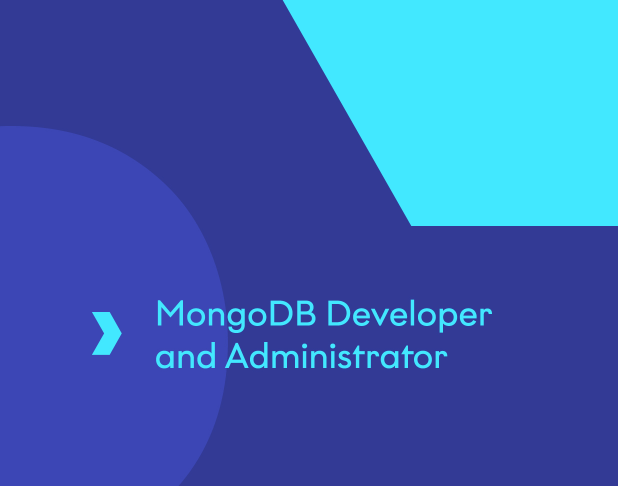Learn about data replication with MongoDB and gain insights about installing, updating and maintaining MongoDB environment. The course also includes industry-based projects in e-learning and telecom
April Sale - up to 25% off training courses – use code: APRIL25NZ
MongoDB Developer and Administrator
Select your learning method:
Please complete the form to ensure your quote is accurate and we will contact you soon.

Harness the power of MongoDB for modern data management
This course equips you with the skills to install, update, and maintain MongoDB environments, replicate data, and process unstructured information efficiently. Learn how to manage unstructured data, write Java and Node.js applications, and execute complex queries, boosting your data management expertise and career prospects.
By the end of the course, you will be able to:
- Confidently write in Java and Node JS applications using MongoDB
- Perform installation, configuration, and maintenance of MongoDB environment
- Create and manage different types of indexes in MongoDB for query execution
- Process huge amounts of data using MongoDB tools
- Proficiently store unstructured data in MongoDB
- Understand MongoDB configuration and backup methods
- Understand monitoring and operational strategies
What you'll learn
Gain the skills to install and configure MongoDB environments, optimise performance with indexing, and execute efficient queries. You’ll also learn to process and manage large volumes of structured and unstructured data, giving you the tools to tackle modern data challenges with confidence.
MongoDB – a database for the modern web
MongoDB is a NoSQL database built for the modern web, offering flexible storage of unstructured data like JSON. Unlike traditional relational databases, NoSQL databases use collections instead of tables, enabling faster processing and scalability. MongoDB is ideal for real-time updates, high availability, and dynamic web applications, meeting the demands of today’s data-driven digital landscape.
Writing in Java and Node JS applications using MongoDB
Learn to integrate MongoDB seamlessly into Java and Node.js applications, enabling dynamic data management and real-time updates. You'll be empowered to build scalable, high-performance apps tailored to modern needs, such as cloud-based services, IoT solutions, real-time analytics platforms, and mobile-first applications. The MongoDB’s flexibility combined with Java and Node.js is a powerful combination that will help you create powerful solutions that meet the needs of today’s modern development environment.
MongoDB tools
MongoDB tools help you simplify data management by enabling efficient storage, processing, and analysis of large datasets. They support tasks such as querying, indexing, and data replication, ensuring high performance and scalability. By streamlining complex operations, MongoDB tools enable you to manage unstructured data effectively, optimise workflows, and unlock valuable insights from your business’s data.
- Access to the accredited online learning materials for 12 months
- Six hands-on lab exercises to be executed in a virtual machine
- 17 hours of self-paced video
- Three industry-based projects on in e-learning and telecom domains
- 60 demos explaining key concepts
FAQs
Delivered in partnership with Simplilearn, the MongoDB Developer and Administrator course equips you with essential skills to install, configure, and manage MongoDB environments. Learn to handle unstructured data, create efficient queries, and process large datasets. With practical projects and hands-on training, this course prepares you for real-world database challenges and enhances your expertise in modern data management.
Why should I take this course?
This course is ideal if you want to build in-demand skills for modern database management. You’ll learn how to effectively use MongoDB for real-world applications, from setting up environments to processing unstructured data and optimising performance. It’s a practical, career-enhancing course designed to help you succeed in today’s data-driven world.
How does this course benefit my career prospects?
This course enhances your career prospects by teaching you sought-after MongoDB skills. You’ll learn to manage large datasets, optimise database performance, and create scalable solutions, which are crucial in today’s data-driven businesses. For example, you could streamline operations by improving query efficiency, enable real-time analytics for smarter decision-making, or design robust applications that support company growth. These skills are highly valued across industries, helping you be successful in roles including Database Administrators, Data Engineers, and Developers.
Are there any prerequisites for this course?
Yes, you need a basic knowledge of any programming language, and an understanding of any database, SQL, and query language for databases. It is also advantageous to have a working knowledge of Linux or Unix based systems, but not mandatory. Also, it’s recommended to take at least one of the Big Data Hadoop Developer or Big Data Hadoop Administrator courses, as they give a good foundation for this one.

"The quality of education provided is comparable to none. Great stuff!"

"Excellent courses, services and support."
learners